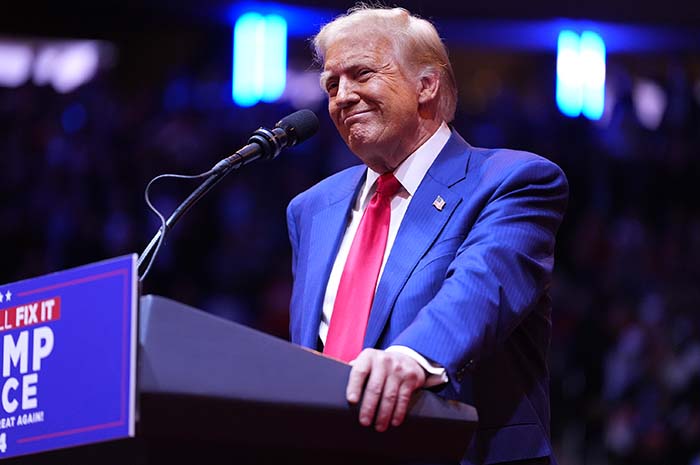Interviews / Gender and Geopolitics Observatory
12 November 2024
Election of Donald Trump: What Are the Consequences for Foreign Policy and Women’s Rights in the United States?

Four years after his defeat to Joe Biden, Donald Trump will soon return to the White House. While the Republican’s victory over his rival, Kamala Harris, was seen as possible, the scale of it surprised observers and raises questions about the transformation of the U.S. electorate. His re-election also brings uncertainties about the future of the country’s domestic and foreign policy. How can Trump’s victory be explained? What impact could it have on various conflict hotspots and U.S. foreign policy? What have been the consequences of the general elections on women’s rights in the United States? An analysis by Marie-Cécile Naves, Research Director at IRIS and Director of the Gender and Geopolitics Observatory at IRIS.
How should the results of the U.S. presidential election and the diversification of the Republican electorate be interpreted?
It will take time to analyze and fully understand this election, as electoral sociology will take time to establish, especially since it varies by federal state. However, it can be said that Donald Trump has not expanded his electorate, but rather diversified it by gaining Latino voters (and possibly Latina voters) and appealing to young men, particularly those without a college degree. Kamala Harris, on the other hand, secured a majority of female voters and college graduates but garnered several million fewer votes than Joe Biden in 2020. While several explanatory variables are already emerging, they cannot be reduced to a single parameter (the economy, inflation, immigration, etc.). These elements certainly played a role, but they are not enough to explain the result. The situation is even more complex because the issue is not just national. Around the world, “strong men” with a penchant for political and verbal brutality, nostalgia for a fantasized past, promises of unrestrained capitalism, and a thirst for revenge are winning elections or aspiring to power.
Kamala Harris’ ground campaign was impressive, limiting the damage in key states, but it failed to unite all the progressive forces that Joe Biden had built in 2020. Environmental issues were absent. Engagement in distant wars is an outdated, unpopular agenda. Unconditional support for Israel and the massacres in Gaza likely cost votes in Michigan. In the U.S., as elsewhere, political leaders in office during the COVID-19 pandemic also paid a heavy price for this global trauma, the psychological effects of which were likely underestimated. Despite stimulus plans and a decrease in unemployment, Joe Biden and Kamala Harris were unable to shake off persistent unpopularity.
But it’s not just about that. The fear of the country’s decline, the difficulty in projecting the future, the real or imagined dangers—everything was orthogonal to the story told by Kamala Harris, that of abstract optimism. Perhaps, for part of America, it is also unimaginable to elect a woman. Another factor is that in 2020, Trump was the incumbent, while in 2024, he was the outsider. He was perceived as being outside the system, despite being deeply entrenched in it. “Make America Great Again” thrives on apocalyptic rhetoric, and its agenda oscillates, not without contradictions, between limitless freedoms (of speech, business) and authoritarianism (on the movement of people, access to healthcare, bodily autonomy, etc.). Verbal violence and elbowing one’s way through become signs of respectability. Insults and cruelty are the norm. Social bonds, responsibility, and care for others are seen as weaknesses, signs of inefficiency, in a society perceived as increasingly threatening, and in a world itself viewed as hostile towards the United States. The line between reality and entertainment blurs. The economic model of buzz and social media clashes, along with media coverage obsessed with Trump, provide a powerful echo chamber for massive disinformation campaigns (which the Democrats either underestimated or failed to address).
What will be the consequences of Donald Trump’s election on U.S. foreign policy?
On a global scale, the United States will exercise its power differently under Donald Trump: they will no longer aim to be a model of multilateralism, but will appear as a superpower that instills fear and adopts a transactional foreign policy. This shift comes at a time when the U.S.’s position is increasingly contested (e.g., BRICS+). A change from 2016: the major business figures who funded Trump’s campaign will take positions in the administration. Will there be SpaceX leaders at the Pentagon? Billionaires like Scott Bessent (hedge fund manager) at the Treasury Department (which plays a role in imposing sanctions on Russia)?
It must be clear: the promise to disengage the U.S. military or reduce American military support in various regions of the world does not equate to peace. In Europe, the fate of Ukraine remains very uncertain. For Donald Trump, NATO is not a solidarity body in the face of conflicts but an organization that allows its members to benefit from American protection at a low cost. J.D. Vance has already threatened Europeans with NATO disengagement if they decide to regulate X or impose tariffs on Tesla cars.
Will Europe be able to agree on military and commercial plans? Nothing is less certain. On one hand, Donald Trump has allies in Europe, but on the other, there is no European foreign policy, defense policy, or arms policy. Trump’s first term is a failed precedent for European unity.
In terms of trade, will we stand together if Trump decides to impose tariffs on German cars? How will we respond to tariffs of 10 to 20%? We failed to agree on how to handle Joe Biden’s protectionism—what will happen tomorrow?
And how can we have a say in the strategic competition between the U.S. and China? China will consider Europe a fallback market if the U.S. imposes tariffs on Chinese products, and it won’t just redirect its exports. It could also reduce its imports. The European trade deficit with Beijing could worsen. And Donald Trump will demand that Europeans condemn China’s overproduction policies (“tit for tat”).
What will be the repercussions of these general elections on women’s rights in the United States?
Kamala Harris’s focus on abortion rights helped limit the damage during her campaign, and referendums on the issue overwhelmingly confirmed this right at the local level. The consequences of a second Trump presidency would be catastrophic for women because the Trump ecosystem is driven by a desire for revenge against #MeToo and the Women’s March, and it’s not just about rolling back gender equality achievements due to anti-feminism but about promoting a deeply misogynistic agenda. J.D. Vance, the future vice president, believes that women without children are useless and should be taxed more. In the MAGA framework, abortion rights condition women’s autonomy, so it must be abolished. We can expect restrictive federal laws on abortion or the resurrection of the Comstock Law from the 19th century, which would lead to a nationwide abortion ban. Assisted reproductive technology (ART) and contraception are also at risk, and the public health crisis caused by the 2022 Supreme Court Dobbs decision is likely to worsen. The fight against discrimination, against gender studies in universities, and the persecution of feminists: we can expect anything.

